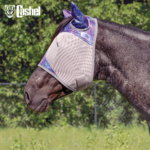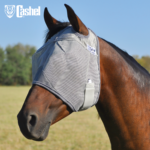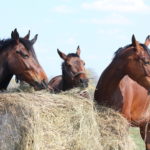After living for 25 years with nary a colic nor a cough, my senior Thoroughbred gelding, Annapolis, suddenly experienced two episodes of choke in one weekend. In the first case, the barn owner where I board him was able to load him into a trailer and rush him to a local veterinary clinic for emergency care. In the second case, she was able to dislodge the obstruction with the first aid response of gentle massage, and the on-call vet met me at the barn for a follow-up. In both cases, I made the usual 30-minute drive to the barn in record time, expecting the worst on my arrival.
What is Choke?
So what exactly is choke and what causes it? Basically, choke is when partially chewed food gets wadded up and stuck in the esophagus. The horse coughs excessively, trying to shift the mass. Saliva and particles of food exit the nostrils, since the horse is unable to swallow. Depending on where the obstruction is, you may or may not be able to see a lump from the outside.
Causes of Choke
A number of factors can lead to a choke.
- Horse not chewing feed completely, due to dental problems, such as missing or painful teeth, sharp points, etc.
- Horse eating too quickly and swallowing before food is chewed properly.
- Horse not producing enough saliva to wet food properly when eating.
- Partial obstruction of the esophagus due to tumor, or scarring from old injuries etc.
In Annapolis’ case, the vets at the clinic summized that his choke was probably caused by his not chewing properly because of some points that had developed on his teeth and that he was overdue for a visit from the equine dentist. They also “scoped” his esophagus once the choke had been cleared, and were able to confirm that he had no obstructions from scarring, tumors or other causes.
Treating Choke
As soon as you suspect your horse is choking, remove all feed and hay, so he can’t eat anything else, adding to the problem. Call the vet immediately.
While you’re waiting for the vet, encourage the horse to stand quietly, with his head down. This will lessen the chance that anything he coughs up will find it’s way into his trachea and lungs and possibly cause aspiration pneumonia, a complication that sometimes arises after a choke has cleared.
When treating choke, the vet’s objective is to clear the obstruction from the esophagus. He does this by passing a tube through the horse’s nostril and down into the esophagus, to the point of the obstruction.
The vet then flushes water into the tube and syphons it back out again. This usually has to be done many times, sometimes taking two or more buckets of water. Each time, a bit more of the matted food is washed away and the mass gets smaller.
This can be an extremely messy operation, especially if the horse is coughing and shaking his head around, as Annapolis did in spite of being sedated. Wet food matter can get flung everywhere.
By carefully working the tube back and forth in the esophagus, the vet can move the obstruction down into the stomach and clear the choke. Care has to be taken that the esophagus is not damaged or ruptured in the process.
Preventing Choke
There are a number of ways in which the horse owner can help prevent a choke. Here are the tips my vet gave me after treating Annapolis.
- Most Important – schedule regular dental exams. For a senior horse, such as Annapolis, this should be twice yearly.
- Switch to a “Senior” feed that is more easily chewed and digested.
- Wetting the feed down also helps with chewing and digestion.
- If the horse tends to bolt his food (as Annapolis does) place one or more large rocks in the feeder so the horse has to pick around them to get to his grain.
- Schedule as much turnout time as possible, so the horse can graze between meals, which may make him eat his grain more slowly.
By using one or more of the above management techniques, you should be able to successfully prevent choke. In my case, I had thought that getting Annapolis’ teeth floated would solve the problem, but when he choked a third time, about a month later, we also added a large rock to his feeder, to slow down his eating and stop him from gulping large mouthfuls of food.
So far (knock on wood) that seems to have done the trick.





